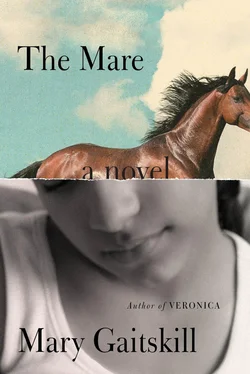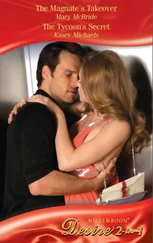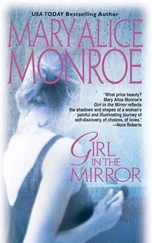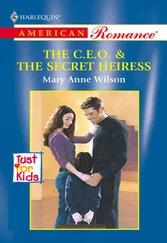“You did what you could,” said my mother. “We all did.” I wanted to say, You did what you could to destroy her, but she was crying already. I was glad I didn’t say anything; my mother died of a heart attack a month later. When my sister and I were teenagers, my mother had acted like Melinda was nothing but an aggravation who had contributed to the end of her marriage. But then she would play cards and clown around in the kitchen with her like she never did with me. Toward the end of her life, Melinda was always on the phone with our mom; she’d even pull over and call my mom on her cell if she was lost on her way to wherever she was going, which was often.
When the shock was still wearing off, I would go for long walks through the small center of town, out onto country roads, then back into town again. I’d look at the women with their children; I’d look into the small, beautiful faces and think of Melinda when she was like that. I’d imagine my mother’s warm arms, her unthinking, uncritical limbs that lifted and held us. Shortly after Melinda died our washing machine broke and I had to go to the Laundromat; I was there by myself and this song came on the radio station that the management had on. It’s a song that was popular in the ’70s about a girl and a horse who both die. I was folding clothes when I recognized it. The singer’s voice is thin and fake, but it’s pretty, and somewhere in the fakery is the true sadness of smallness and failure and believing in beautiful things that aren’t real because that’s the only way to get through. Tears came to my eyes. When Melinda was little, she loved horses. For a while, she even rode them. We couldn’t afford lessons, so she worked in a stable to earn them. Once I went with my mother to pick Melinda up from there, and I saw her riding in the fenced area beside the stable. She looked so confident and happy I didn’t recognize her; I wondered who that beautiful girl was. So did our mother. She said, “Look at her!” and then stopped short. They say she died one winter / When there came a killin’ frost / And the pony she named Wildfire busted down its stall / In the blizzard he was lost. It was a crap song. It didn’t matter. It made me picture my sister before she was ruined, coming toward me on a beautiful golden horse. She’s coming for me I know / And on Wildfire we’re both gonna go. I cried quietly, still folding the clothes. No one was there to see me.
It was a year later that I started talking about adoption. At first Paul said, “We can’t.” Although he didn’t say it, I think he was hurt that I hadn’t really tried to have his child, but now I wanted some random one. Also, his daughter from his first marriage, Edie, didn’t want to go to school where he teaches and he’d promised to pay her tuition at Brown after his ex-wife had thrown a fit about it. Even if money weren’t an issue, he didn’t think we would have the physical energy for a baby. “What about an older child?” I asked. “Like a seven-year-old?” But we wouldn’t know anything about the kid, he said. They would come fully formed in ways that would be problematic and invisible to us until it was too late.
We went back and forth on the subject, not intensely, but persistently, in bed at night and at breakfast. Months went by; spring came and the dry, frigid winter air went raw and wet, then grew full and soft. Paul’s eyes began to be soft when we talked too. One of his friends told him about an organization that brought poor inner-city kids up to stay with country families for a few weeks. The friend suggested it as a way to “test the waters,” to see what it might be like to have somebody else’s fully formed kid around.
We called the organization and they sent us information, including a brochure of white kids and black kids holding flowers and smiling, of white adults hugging black kids and a slender black girl touching a woolly white sheep. It was sentimental and flattering to white vanity and manipulative as hell. It was also irresistible. It made you think the beautiful sentiments you pretend to believe in really might be true. “Yes,” I said. “Let’s do it. It’s only two weeks. We could find out what it’s like. We could give a kid a nice summer, anyway.”
Dante wasn’t on the same bus as me — his was supposed to go at seven thirty and then me at nine. Outside the Port Authority were dirty homeless sleeping against the walls; inside, mostly closed stores, hardly anyone but police, and ugly music playing. We went where they said to meet them and nobody was there. My mom told me to ask a police if this was where the Fresh Air Fund was supposed to be and he said he didn’t know anything about that, which made my mom look worried and Dante glad because maybe we would just go home. I thought we were just there too early as usual, and I was right: While we were standing there, these people wearing green T-shirts came smiling at us, carrying yellow metal fences like they use to keep people back at parades. They said, “Great, you’re early, that’s great,” and then they made a big square place with the fences and put a sign on it. They laughed and smiled with each other and then over at us. They put up tables and got out their computers and said they were ready. But then they wouldn’t let us all the way in behind the fence, just Dante; he had to be inside the fence by himself. They told us he would get used to it, but that we could stand right by the fence until he left. They put a information card around his neck and gave him a coloring book, but he dropped it and ran to the fence to grab my mom, crying, “I’m hungry, I’m hungry!”
If it was me, my mom would’ve told me to shut up and gone to work. But Dante, she put her hands through the fence and talked to him like a baby, like “my little mother-nature boy!” But he wouldn’t be quiet, so she gave me money and told me to go get him a cookie and her a coffee at this place that just opened, we saw this sad-faced man opening it.
She always pays attention to Dante when he cries, so he cries a lot. Or pretends to. Especially since he got poisoned by the babysitter. That was before Crown Heights or even Williamsburg; we lived in Queens then, all of us in one room that smelled like the garbage under the sink no matter how many times we took it out. I was eight, Dante was three. The babysitter was a girl named Rose who lived down the block, the daughter of the lady who did my mom’s hair. She wanted to watch a TV show that wasn’t what Dante wanted and he wouldn’t shut up about it. He started crying that something hurt, so she gave him aspirin. He kept crying, probably because they were the orange chewy kind and he wanted more. She gave him the whole bottle and he went to sleep.
When I got back with the cookie and coffee, he was still sort of pretend-crying; he even kept doing it while he ate the cookie. Other kids were inside the fence by then, and they were coloring in books with the Fresh Air Fund people. I wished I could go in there, just to sit down away from Dante and my mom. I even asked if I could, but they said no, I couldn’t go in until my group came.
I walked around in a circle behind my mom, dragging my suitcase until this girl in a green T-shirt said I could leave it inside the yellow fence; then I walked around without it. More people were in the station, their faces looking like they were already someplace else. More kids were coming too — the fenced-in Fresh Air space was filling up. Kids were sitting on the floor coloring in books or playing cards while the people in green shirts watched. Other moms were standing along the fence, with their children close to them. This boy came up to Dante and said, “Don’t be scared. You’ll like it. Where I’m going, they have a swimming pool.” I felt like I could walk away and nobody would see me.
Читать дальше












